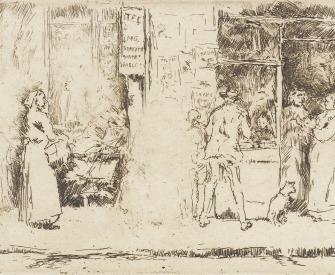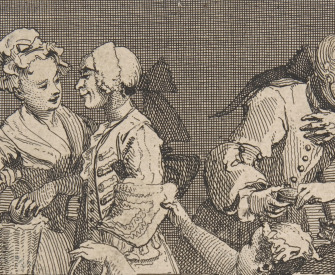It was the men I deceived the most that I loved the most.
—Marguerite Duras, 1987Competitive Edges
Ms. Tarbell on Mr. Rockefeller.
It is quite probable that John D. Rockefeller, natural trader that he was, learned early in his career that unless one has some special and exclusive advantage over rivals in business, native ability, thrift, energy, however great they may be, are never sufficient to put an end to competition. Mr. Rockefeller certainly saw by 1868 that he had no legitimate superiority over those competing with him in Cleveland that would ever enable him to be anything more than one of the big men in his line. He must have seen clearly by this time that nothing but some advantage not given by nature or recognized by the laws of fair play in business could ever make him a dictator in the industry to which he was giving his attention. But he was beginning to see there was such an advantage to be had if one were wily and patient enough. It lay in transportation, in getting his carrying done cheaper than his neighbors could. It was a very seductive idea to a man with a passion for wealth.
There were difficulties in the way. Men generally held then, as now, that it was not fair for the railroads to allow one shipper a better rate than another. The common law was known to disapprove the practice. The theory that the railroad held its right of way from the people, and therefore must be just to the people, treating them without discrimination, was familiar enough, so familiar that the railroads never dared show favoritism save secretly. But under threats of loss of business, under promise of larger or more regular shipments, under chances of sharing in the profits of the enterprises they favored, they did do it secretly. That is, rebate giving then, as now, was regarded as one of those lower business practices which characterize commerce at all periods, and against which men of honor struggle, and of which men of greed take advantage. Naturally, one would expect Mr. Rockefeller to spurn such an advantage. The one thing for which he was conspicuous outside of his zeal for business was his devotion to the church, one of whose cardinal teachings is “Whatsoever ye would that men do to you do ye even so to them.” Naturally, one demands a man of his profession to be keenly alive to degrading business practices and keen to overthrow them. But, although Mr. Rockefeller no doubt heard weekly from the pulpit that the “law and the prophets” were all summed up in doing as you would be done by, it is quite probable he had never seen any connection between the doctrine and railroad rebates. He was not an educated man. He had evidently never thought seriously of anything but making money. His religious training seems to have been purely formal, awakening him merely to the duty of attending to devotional exercises and giving to the church. So, when he realized that the rebate was the means by which he could gain control of the oil industry in Cleveland, he went after it, ignorant of, or indifferent to the ethical quality of the act.
His beginnings in discrimination seem to have been small—but their effect in increasing his business and in decreasing that of his rivals was large—and as Mr. Rockefeller saw in increased profits the effect of the advantages gained, he became eager to increase these advantages, eager to secure them by permanent contracts. The question became one of the chief concerns of his business life. Finally he and certain of his friends whose ambitions were similar to his own, and who appreciated as he did the power the railroad rebate had to destroy a competitor’s property, hit on a scheme. These gentlemen proposed to certain high railroad dignitaries, W. H. Vanderbilt, Thomas Scott, Jay Gould, H. W. Clarke, and General McClellan, to allow them a rebate on all the freight they shipped and to allow nobody else one. They proposed not only that they be allowed to ship cheaper than anybody else, but that the extra money their rivals paid to the railroads be not kept by the roads but paid over to them! They also asked to be allowed to examine weekly the shipping books of the transportation lines that they might know how much and to whom their competitors shipped. It was a strong scheme even for the strong stomachs of the men to whom it was presented. Old Commodore Vanderbilt told “Billy,” as he called his son, to let it alone. Even Tom Scott balked at it from the first.

The Calumny of Apelles, by Sandro Botticelli, c. 1495. Deceit, Treachery, and Calumny (led by Envy) drag a young man before King Midas (flanked by Ignorance and Suspicion) while Remorse turns to look at naked Truth.
But the men who had devised the Southern (or South) Improvement Company, as the plan was called, were in earnest. They knew that if they could get the contracts they asked, they could control one of the richest industries of the country, and they turned their whole force to overcome the objections raised by the railroad presidents. And to do it they hesitated at no misrepresentation, found no falsehood too big to swallow. “This makes you a monopoly,” the railroads objected. “It will ruin everybody outside of your combination.” “But we have already the great bulk of the business and we are going to take all in,” which was untrue. The gentlemen had in their company only about one-tenth of the manufacturing end of the industry they aimed to control. “It puts the producer at your mercy,” objected Mr. Scott. “But the producers want the business regulated and are going to join.” Again untrue, for the producers knew nothing of what was afoot.
Men were born to lie, and women to believe them.
—John Gay, 1728They were a persuasive body—those South Improvement advocates, and they had great arguments. “Sign these contracts, and we shall control the business, then you will have but one party to deal with. Think of the ease in handling your freight? Sign these contracts and we will divide the trade, thus saving you the wear and tear of securing your quota—preventing rate wars. Think of the profits!” And the contracts were signed—secretly of course. And when they were signed what did Mr. Rockefeller do? He swooped down on a great industry in his hometown with the proof that henceforth he was not only to have rates fully 100 percent cheaper than his competitors, but he was to have the extra 100 percent they paid! And he told them they had better sell—at his price; twenty-one out of twenty-six did, and by March 1872 young Mr. Rockefeller was practically the only oil refiner in Cleveland, Ohio, where three months before there had been twenty-six.

Ida M. Tarbell
From “John D. Rockefeller: A Character Study.” In this article—published in McClure’s Magazine in 1905—Tarbell refers to the South Improvement Company, an association purported to stabilize prices in the oil industry but that privately was a means for Rockefeller and others to eliminate competitors. The Pennsylvania legislature revoked the company’s charter in 1872. Tarbell’s The History of the Standard Oil Company, published in 1904, is thought to have accelerated the breakup of Rockefeller’s oil trust, an event that resulted officially from a Supreme Court ruling in 1911.


